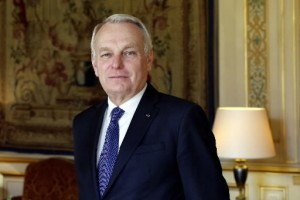Foreign ministers’ meeting in Hiroshima: Written interview with Jean-Marc Ayrault, France’s minister of foreign affairs
Apr. 5, 2016
Have you been to Hiroshima before?
This is my first visit to Hiroshima although I have had several occasions to visit Japan. I am grateful to Minister Kishida for deciding to host the G7 Foreign Ministers’ meeting in Hiroshima. Hiroshima is a symbol for the tragedy of war. It is a reminder for the international community of the importance to join hands to preserve world peace. I am confident that this spirit will inspire our talks between the G7 Ministers of Foreign Affairs.
Do you support “a world without nuclear weapons”?
France is committed to creating the conditions of “a world without nuclear weapons” based on a progressive and reasonable approach to disarmament in a way that promotes international security and stability. The entry into force of the Comprehensive Nuclear-Test-Ban Treaty (CTBT), which celebrates the 20th anniversary of its signature (at the U.N. General Assembly) this year, and the launch of negotiations on a Fissile Material Cut-off Treaty constitute the next steps in disarmament. For the Cut-off Treaty, France has promoted an ambitious and realistic negotiation.
We also expect the United States and Russia, which possess by far the biggest nuclear weapons stockpiles, to continue their bilateral efforts to reduce these stockpiles.
What are your hopes for the foreign ministers’ meeting?
Terrorism is one of the major challenges to peace in today’s world. We need to address its root causes. We also need to tackle the financing of terrorism, strengthen international cooperation between police, customs, and judicial services, and reinforce air security. We expect the G7 Foreign Ministers’ meeting in Hiroshima to send a strong signal in that direction.
Disarmament and nuclear non-proliferation will also be high on the agenda. In the context of North Korea’s repeated provocations which threaten the international non-proliferation and arms control regimes, we have to ensure the full implementation of the United Nations Security Council resolution (adopted this March) to reinforce sanctions against the North Korean regime.
The implementation of the Paris COP 21 (the 21st Session of the Conference of the Parties to the United Nations Framework Convention on Climate Change) agreement is also a priority. The G7 Foreign Ministers’ meeting will provide the opportunity to discuss the way forward to materialize this historical agreement.
Do you have any suggestions as to what the youth of Hiroshima can do to promote peace?
International conflicts and disputes, including over historical issues, must be solved through dialogue. This is what Europe has accomplished since 1945, including the reconciliation between France and Germany. Youth exchanges have played a key role in this process. I am convinced that the youth of Hiroshima can contribute in the same way, foster better understanding between Japan and its neighbors, and promote peace and stability in the world.
(Originally published on April 5, 2016)
Read the full interview here.
This is my first visit to Hiroshima although I have had several occasions to visit Japan. I am grateful to Minister Kishida for deciding to host the G7 Foreign Ministers’ meeting in Hiroshima. Hiroshima is a symbol for the tragedy of war. It is a reminder for the international community of the importance to join hands to preserve world peace. I am confident that this spirit will inspire our talks between the G7 Ministers of Foreign Affairs.
Do you support “a world without nuclear weapons”?
France is committed to creating the conditions of “a world without nuclear weapons” based on a progressive and reasonable approach to disarmament in a way that promotes international security and stability. The entry into force of the Comprehensive Nuclear-Test-Ban Treaty (CTBT), which celebrates the 20th anniversary of its signature (at the U.N. General Assembly) this year, and the launch of negotiations on a Fissile Material Cut-off Treaty constitute the next steps in disarmament. For the Cut-off Treaty, France has promoted an ambitious and realistic negotiation.
We also expect the United States and Russia, which possess by far the biggest nuclear weapons stockpiles, to continue their bilateral efforts to reduce these stockpiles.
What are your hopes for the foreign ministers’ meeting?
Terrorism is one of the major challenges to peace in today’s world. We need to address its root causes. We also need to tackle the financing of terrorism, strengthen international cooperation between police, customs, and judicial services, and reinforce air security. We expect the G7 Foreign Ministers’ meeting in Hiroshima to send a strong signal in that direction.
Disarmament and nuclear non-proliferation will also be high on the agenda. In the context of North Korea’s repeated provocations which threaten the international non-proliferation and arms control regimes, we have to ensure the full implementation of the United Nations Security Council resolution (adopted this March) to reinforce sanctions against the North Korean regime.
The implementation of the Paris COP 21 (the 21st Session of the Conference of the Parties to the United Nations Framework Convention on Climate Change) agreement is also a priority. The G7 Foreign Ministers’ meeting will provide the opportunity to discuss the way forward to materialize this historical agreement.
Do you have any suggestions as to what the youth of Hiroshima can do to promote peace?
International conflicts and disputes, including over historical issues, must be solved through dialogue. This is what Europe has accomplished since 1945, including the reconciliation between France and Germany. Youth exchanges have played a key role in this process. I am convinced that the youth of Hiroshima can contribute in the same way, foster better understanding between Japan and its neighbors, and promote peace and stability in the world.
(Originally published on April 5, 2016)
Read the full interview here.








